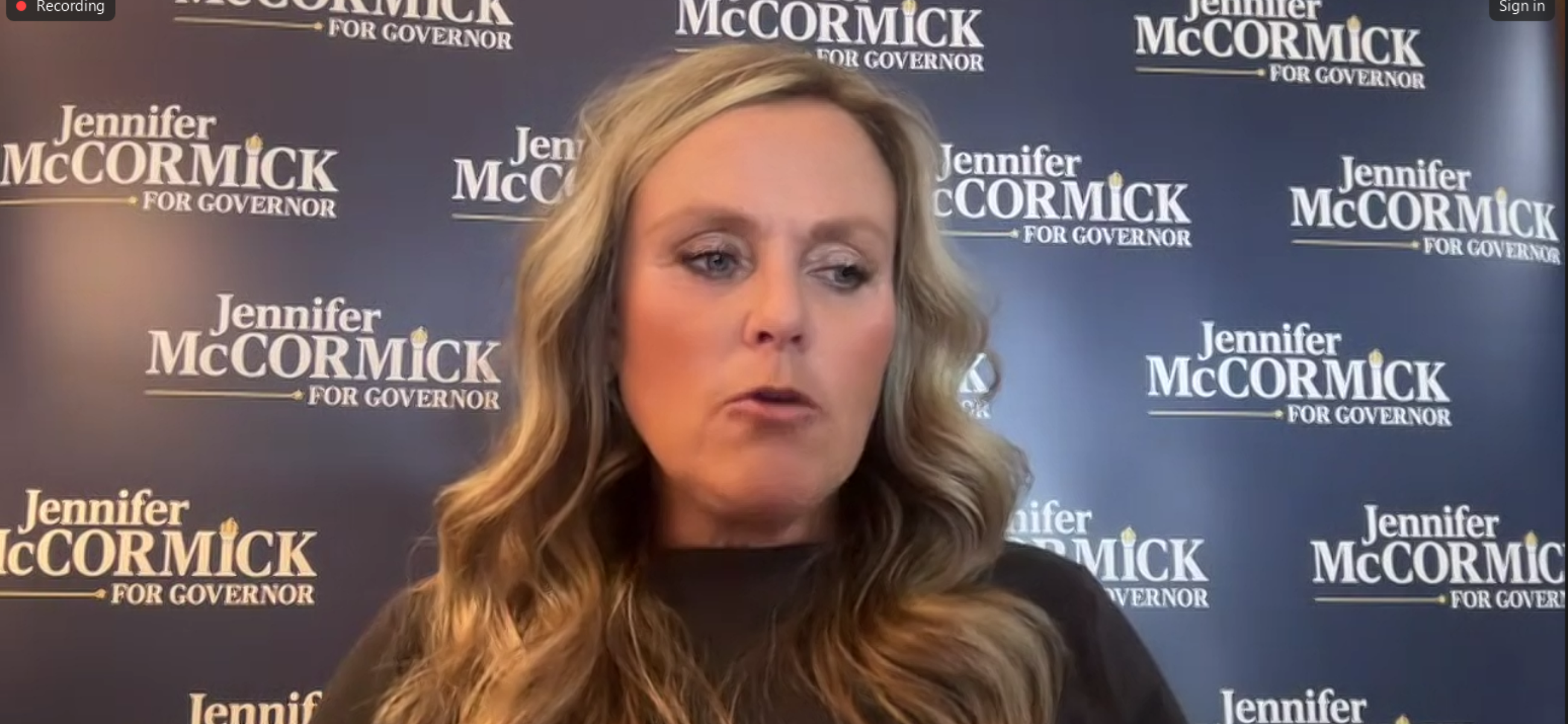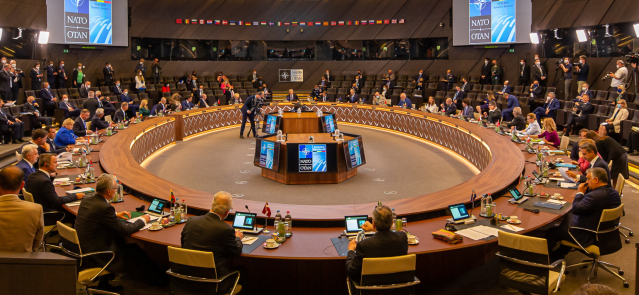Stay ahead of the curve as a political insider with deep policy analysis, daily briefings and policy-shaping tools.
Request a Demo
Democratic gubernatorial nominee Jennifer McCormick speaks at a virtual news conference on Sept. 26, 2024. (Credit: Rory Appleton)
- Education, child care and health care reforms among McCormick’s priorities
- McCormick calls for IEDC changes, pause on controversial LEAP district program
- State should also reverse social policies, such as abortion ban, McCormick said
Democratic gubernatorial nominee Jennifer McCormick proposed a retooling of the state’s budget and economic development strategy to prioritize individual Hoosiers’ needs — child care, education, health care, better maintained cities and an expanded earned income tax credit — as part of a business and economic platform rolled out Thursday morning.
“Our approach is balancing that pro-business, which is incredibly important, but also bringing in that pro-Hoosier — the human capital piece,” McCormick said at a news conference.
McCormick also stressed the importance of bringing more economic development to rural areas of the state.
“Although we’ve had regional pockets of success, we still have 92 counties that we need to pay attention to,” she said. “All Hoosiers deserve a strong economic development plan that starts with education.”
Quality of life changes
McCormick painted many of her suggested reforms as quality of life improvements meant to attract and retain workers.
She called for more education funding at all levels, as well as additional training programs at local colleges and apprenticeship programs in union trades. The proposed school spend would fund universal pre-K instruction across the state.
McCormick’s plan would also create a state corporate income tax credit for businesses who provide on-site or nearby child care for employees. Other incentives would be offered for companies that create health care wellness programs.
The proposal calls for expanding the earned income tax credit and considering limits to the state’s tax abatement program, which McCormick said would increase local tax bases to fund police officers, fire departments, parks and other services.
The state must also prioritize “health care freedom,” which McCormick said included reversing Indiana’s near-total abortion ban, as a means for economic development.
“The [abortion] rhetoric around Indiana right now plays into brain drain,” she said. “It plays into attracting great businesses and retaining great businesses.”
She made a similar argument against Indiana’s Religious Freedom Restoration Act, which allows businesses to deny services based on religious grounds. McCormick claimed the controversial law made “many believe we are not a welcoming state that values diversity.”
McCormick said her administration would prioritize “stopping extreme and socially divisive policies.”
Limits on IEDC
The Indiana Economic Development Corporation has “overextended its original mandate,” McCormick said, by getting involved in real estate development and allowing some regions access to major business opportunities but not others.
She called for transparency and public disclosure of IEDC business, as well as increased use of Regional Economic Acceleration and Development Initiative (READI) grants to target revitalization in cities and towns that have fallen into disrepair.
The IEDC recently reported a record-setting $38.3 billion in committed investments across the state so far in 2024. It raised a pledged $28.7 billion in 2023.
McCormick said she would pause all operations within the expansive LEAP Lebanon Innovation District project in Boone County until questions surrounding its environmental and local impacts could be answered.
“We still don’t know LEAP’s price tag,” she said.
Support for small businesses
McCormick’s plan would create incubator programs for entrepreneurship, look to remove small business regulations where possible and push state agencies to offer support to local companies.
State agencies would also prioritize offering aid to local governments. Cities and towns might help attract and retain workers by making investments in parks, restaurants and other improvements.
“Achieving more sustainable growth across Indiana requires the state’s economic development strategy to move away from massive tax giveaways to the largest corporations and instead focus on attracting and retaining highly skilled people,” the policy proposal reads.
How to pay for these plans
Asked how she planned to get the funding for her reforms, McCormick said most of her proposals could be funded by redistributing money in the existing budget.
“We seem to find billions for the LEAP project with very little accountability, so the dollars are there,” she said.
Some portions of the plan would eventually pay for themselves, she added. Investing in child care, for example, would cut down on billions of dollars lost in the economy due to employees leaving the workforce or cutting their hours.
McCormick said her running mate, former longtime state Rep. Terry Goodin, could help facilitate deals with the Republican-controlled Indiana General Assembly on some of the proposals.
“I have faith that we can come up with some solutions,” she said.
State Affairs has reached out to the campaign of U.S. Sen. Mike Braun, the Republican nominee, for his reaction to McCormick’s plan. It did not provide one before publication time.
Contact Rory Appleton on X at @roryehappleton or email him at [email protected].
Know the most important news affecting Indiana
Get our free weekly newsletter that covers government, policy and politics that impact your everyday life—in 5 minutes or less.
The man behind the governor: Josh Kelley’s journey to Indiana leadership
As Gov.-elect Mike Braun’s transition team and priorities take shape, his right-hand man prepares to lead the staff tasked with ensuring the incoming governor’s vision becomes reality. Josh Kelley has quickly established a political career marked by several key achievements, including anchoring two statewide campaign victories, serving as Braun’s chief of staff in the U.S. …
COLUMN: Trump should seek Ukraine NATO membership on day 1
INDIANAPOLIS — The North Atlantic Treaty Organization is a military alliance founded in 1949 following World War II to keep Soviet influence in check. The United States is one of 12 founding members. There are 32 members, including Canada, the United Kingdom, Germany, Poland, France, Spain and Italy. Article 5 of NATO’s charter states that …
Howey Politics Indiana celebrates 30th anniversary
Storied Indiana political columnist Brian Howey was honored Tuesday at a gala celebrating his 30th year at the helm of his namesake newsletter, Howey Politics Indiana. Howey was joined at the event by his wife Susan, his fellow State Affairs teammates and political insiders. Know the most important news affecting Indiana Get our free weekly …
Incumbents win in 2 tight Indiana House races; Cash-Stoner outcome uncertain
The election outcome remained uncertain in one Indiana House district where Republican incumbent Becky Cash was leading Democrat Tiffany Stoner by less than one-tenth of a percentage point. Two other House incumbents — Republican Rep. Dave Hall and Democratic Rep. Wendy Dant Chesser — prevailed with narrow victories that aren’t expected to face recount challenges. …




